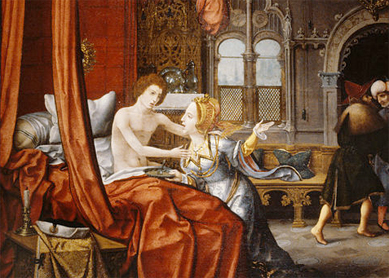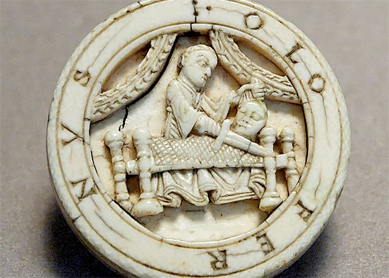The story of Judith would make a blockbuster movie, with its seduction, suspense, war, violence, and feisty, beautiful widow. Few biblical characters have generated as much controversy. One of only four women to lend her name to a biblical book (Esther and Ruth in the Hebrew Bible and Susanna in the Apocrypha are the others), Judith challenges stereotypes about women in both the ancient and the modern worlds. Taking the form of a Jewish novel, Judith’s story unfolds in the context of war. Holofernes, the general of King Nebuchadnezzar, has laid siege to the Israelite town of Bethulia, where Judith lives, in a campaign of terror against the western nations of the Fertile Crescent. Judith beautifies herself, leaves the protection of Bethulia’s walls, enters the enemy camp, seduces Holofernes, decapitates him with his own sword, and sneaks his head out of the enemy camp in her food bag to display on the walls of Bethulia. The Bethulians plunder the panicked enemy camp and, the foreign army vanquished, celebrate Judith’s victory. She returns home to continue to live as a widow, and “for the rest of her life she was honored throughout the whole country” (Jdt 16:21).
Lying murderer or saintly beauty?
Judith’s name means “Jewess” and may represent the nation Israel as it struggles to keep its Jewish identity in the Greco-Roman world. Childless and wealthy, she is not a typical widow. Judith prays and fasts regularly and keeps kosher, living an almost ascetic life after her husband’s death (Jdt 8:5-6). Her piety is well-known: “No one spoke ill of her, for she feared God with great devotion” (Jdt 8:8). She is honored by the longest genealogy of any biblical woman (Jdt 8:1-2). Like the personified Woman Wisdom of Proverbs, she takes charge, rebuking the elders of the town for putting God to the test in the face of Nebuchadnezzar’s siege (Jdt 8:11-12).
But Judith also lies repeatedly (Jdt 10:12-13, Jdt 11:5-6, Jdt 11:11-15, Jdt 11:17-18, Jdt 12:18) and prays that God will approve her deceit (Jdt 9:10, Jdt 9:13). Her lies drip with irony and double entendre. She thus joins the ranks of other women who lie for the survival of Israel: Rebekah, Tamar, the midwives Shiphrah and Puah, Rahab, and Esther.
Judith invites our censure for bathing herself with water when primping for Holofernes (Jdt 10:3-4), while the people of the town faint from thirst. Judith’s beauty plays a central role in her story (Jdt 8:7, Jdt 10:19, Jdt 11:21) and some condemn her vanity and seduction of Holofernes as negative stereotypes demeaning to women and frightening for men. Critics suggest that her return to widowhood after taking on a male warrior role and killing Holofernes marks her redomestication.
Artists, poets, composers, and scholars through the centuries have understood Judith in widely different ways, saying more about their own times and concerns than about Judith herself. Judith’s chastity has linked her with the Virgin Mary, her manly courage with queens and Zionism, her beauty with eroticism, and her smarts with strong contemporary females.
Was Judith too sexy for the canon?
Though it is absent from the Protestant and Jewish canons, the book of Judith appears in the Roman Catholic and Orthodox Christian canons among the deuterocanonical literature; Protestants include it in the non-canonical Apocrypha. Jewish tradition connects Judith with the Maccabbean revolt and Chanukah. Intentional historical inaccuracies, typical of Jewish novels of the time, mark Judith’s story as fictional and make it difficult to date. Bethulia is an unknown town. The Babylonian Nebuchadnezzar did not rule over the Assyrians in Nineveh (Jdt 1:1), as the city was destroyed in 612 B.C.E., before he became king in 605 B.C.E. The temple to which the Jews had recently returned (Jdt 5:18-19) was rebuilt between 520 and 515 B.C.E., long after Nebuchadnezzar’s rule ended. Perhaps her story was produced during the Maccabean revolt against Greek rulers in the second century B.C.E. or later during the reign of the Hasmonean Queen Salome Alexandra (76–67 B.C.E.), with whom Judith shares many similarities. Both are beloved, pious widows who direct an army and defeat national enemies.
It may be that Judith’s story was produced too late to achieve canonical status. Other problematic aspects of the book include the conversion of the Ammonite Achior (Jdt 14:10), which challenges the prohibition against Ammonites becoming members of the Israelite people (Deut 23:3). Bethulia is placed in Samaritan territory (Jdt 4:6), perhaps tapping into long-simmering Jewish-Samaritan hostility. Judith’s possible connection to the Maccabean revolt may have made her story unpopular when the Hasmonean dynasty crumbled and Rome ended Jewish independence. Ultimately, Judith may have simply been too radical or sexy for her time.
Bibliography
- Clanton, Dan. Daring, Disreputable, and Devout: Interpreting the Bible’s Women in the Arts and Music. New York: T&T Clark, 2009.
- Wills, Lawrence. “The Book of Judith.” Pages 1073–183 in vol. 3 of The New Interpreter’s Bible. Edited by Leander Keck. Nashville: Abingdon, 1999.
- Tilford, Nicole. “Judith and Her Interpreters.” Pages 391–95 in Women’s Bible Commentary. Edited by Carol A. Newsom, Sharon H. Ringe, and Jacqueline E. Lapsley. 3rd edition. Louisville: Westminster John Knox, 2012.





